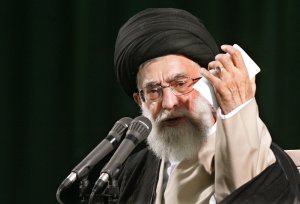Iran’s supreme leader has ordered preparations to begin to increase uranium enrichment, ramping up pressure on European states struggling to keep the Islamic Republic in a nuclear accord.

“The Atomic Energy Organization of Iran is duty-bound to prepare the ground for achieving 190 thousand SWUs,” Supreme Leader Ayatollah Khamenei was quoted saying by Iranian state media, referring to a measure of uranium enrichment capacity.
He said that the increase would be “within the framework of the JCPOA for the time being,” referring to the Joint Comprehensive Plan of Action, otherwise known as the Iran nuclear accord.
Iran will inform the UN nuclear watchdog agency that preparations will begin on Tuesday, Behrouz Kamalvandi, spokesman for Iran’s Atomic Energy Organization, was reported saying by state media.
“The leader [Khamenei] meant that we should accelerate some process … linked to our nuclear work capacity to move forward faster in case needed,” he added.
US withdrawal
US President Donald Trump announced on May 8 that the US was withdrawing from the nuclear deal, pitting him against his European allies.
He said he would initiate new sanctions on Iran, ripping up the touchstone agreement negotiated by his predecessor, Barack Obama.
Since then, Khamenei and other Iranian officials have been on the attack, threatening to increase uranium enrichment.
European countries and China have said they will stand by the existing nuclear accord. But fears are growing in Tehran that European leaders will be unable to prevent Washington from reimposing sanctions on European companies, which would badly damage Iran’s oil economy.
“The Iranian nation will not tolerate to be under both sanctions and nuclear restrictions,” Khamenei said on Monday, according to Iranian state media.
“The words uttered by some European states indicate that they expect the Iranian nation to both agree to comply with the nuclear deal undertakings and live under sanction,” he added.
Europe given six conditions
Last month Khamenei issued a set of demands to European powers in which he voiced skepticism that they would remain committed to the deal.
Khamenei said the accord could only continue if the Europeans fulfill six conditions, including: promising not to question Iran over its ballistic missile program or its regional activities; guaranteeing that Iran’s oil will continue to be sold and compensating for any losses and buying any remaining stock; and having European banks guarantee financial transactions with Iran.
Under the 2015 deal with the US, France, Germany, Britain, Russia and China, Iran agreed to significantly curtail its uranium enrichment capacity so that it could not develop atomic bombs.
In return, Iran received relief from sanctions, most of which were dropped in January 2016.
Trump argued that while Iran complied with the accord, it violated its spirit by fostering discord in the region, supporting groups like Hezbollah, Houthi rebels in Yemen, and the Syrian regime.
Israeli Prime Minister Benjamin Netanyahu kicked off a three-day trip on Monday to persuade the leaders of Germany, France and the UK to abandon the Iran nuclear deal, meeting Chancellor Angela Merkel in Berlin to discuss the threat he says Tehran poses to his country and the wider Middle East.
At a press conference with Merkel in the German capital following their meeting, the two leaders agreed that Iranian influence in the region represented a threat to Israel, though the Chancellor reiterated Europe’s intention to remain in the deal.











